What are the key technical, economic, and societal challenges that arise when transitioning to sustainable and inclusive urban mobility?
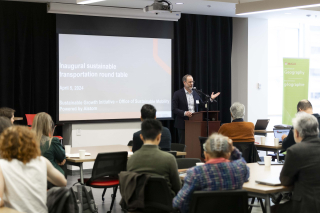 Interdisciplinary experts confronted this question at the inaugural Sustainable Transportation Roundtable , hosted by McGill University’s Sustainable Growth Initiative (SGI) and sponsored by Alstom. Zahoor Chughtai, Associate Director of the SGI, welcomed scholars and business representatives to the event to explore how the transport sector’s overreliance on the combustion of fossil fuels, Canada’s second largest emitter and responsible for 21% of the country’s GHGs, can be curbed by the popularization of electric vehicles, Kevin Manaugh, Head of the Office of Sustainable Mobility at SGI, advocated for collaborative solutions, “The term ‘improve’ can mean the creation of more green space to an urban planner, though to an engineer it means allowing for more vehicles flowing in uncongested traffic. We need to establish a vocabulary of change.” Manaugh presented three key components to sustainable mobility: cycling, walking, and public transportation.
Interdisciplinary experts confronted this question at the inaugural Sustainable Transportation Roundtable , hosted by McGill University’s Sustainable Growth Initiative (SGI) and sponsored by Alstom. Zahoor Chughtai, Associate Director of the SGI, welcomed scholars and business representatives to the event to explore how the transport sector’s overreliance on the combustion of fossil fuels, Canada’s second largest emitter and responsible for 21% of the country’s GHGs, can be curbed by the popularization of electric vehicles, Kevin Manaugh, Head of the Office of Sustainable Mobility at SGI, advocated for collaborative solutions, “The term ‘improve’ can mean the creation of more green space to an urban planner, though to an engineer it means allowing for more vehicles flowing in uncongested traffic. We need to establish a vocabulary of change.” Manaugh presented three key components to sustainable mobility: cycling, walking, and public transportation.
The marginalization of walking: the loss and recovery of sustainable urban mobility
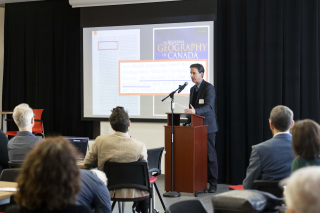 Peter Norton, Associate Professor at the University of Virginia, opened his keynote address by proposing an entry point. “The best thing we can do to achieve the future is to recover a lost history, which will reveal to us a spectrum of opportunities that are so often neglected, disparaged, or disregarded as possible today.” He suggests, that rather than engaging in the carbon-intensive exercise of replacing railway networks or removing the automobile experts explore ways to permit travel in urban and rural areas without placing passenger vehicles at the centre. Referencing Carter Woodson’s criticism of scholars who used history to justify segregation and disenfranchisement, Norton reported that the current state of car dependency is due to the removal of the right that cyclists, pedestrians, and particularly children, had to space, by companies like General Motors. Norton exposed General Motors’ advertising a “love affair” between Americans and the automobile to sell their products and projecting the lifestyle of the wealthy few onto the future of the country under the guise of a cultural sensation.
Peter Norton, Associate Professor at the University of Virginia, opened his keynote address by proposing an entry point. “The best thing we can do to achieve the future is to recover a lost history, which will reveal to us a spectrum of opportunities that are so often neglected, disparaged, or disregarded as possible today.” He suggests, that rather than engaging in the carbon-intensive exercise of replacing railway networks or removing the automobile experts explore ways to permit travel in urban and rural areas without placing passenger vehicles at the centre. Referencing Carter Woodson’s criticism of scholars who used history to justify segregation and disenfranchisement, Norton reported that the current state of car dependency is due to the removal of the right that cyclists, pedestrians, and particularly children, had to space, by companies like General Motors. Norton exposed General Motors’ advertising a “love affair” between Americans and the automobile to sell their products and projecting the lifestyle of the wealthy few onto the future of the country under the guise of a cultural sensation.
 ‘Lightning Talks’
‘Lightning Talks’
Norton’s keynote speech was followed by a ‘Lightning Talks’ round in which ten graduate students were each given five minutes to introduce their approach to sustainable transportation. Speakers included Lexi Kinman, Daniel Romm, Jerome Laviolette, Dan Qiang, Hannah Rebentisch, Maxime Belanger De Blois, Dominique Boulet, Pegah Salsabilian, Noah Kelly, and Paul Redelmeier. The round provided insight into various emerging trends, innovative solutions, and critical inquiries that inform the future of urban mobility. Topics ranged from the use of bus data to the prospect of free transportation for unhoused riders, and discussion delved into the work of platforms like Curbcut, a tool dedicated to advancing urban sustainability. Three afternoon panels explored themes of education, urban street space allocation, and regional rail.
Sustainable principles in transportation education and the evolving design of Montreal’s streets
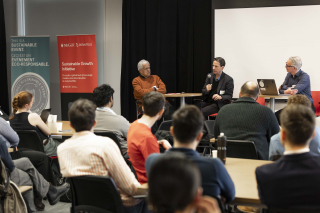 Norton joined Owen Waygood, Professor of Transport at Polytechnique Montréal, and Madhav Badami, Associate Professor jointly appointed to the School of Urban Planning and the Bieler School of Environment, to discuss best practices in transportation education. They made the distinction between the roles of engineers, educators, and historians as mitigators of the climate crisis and discussed ways collaboration could lead to sustainable solutions. Waygood called attention to the education of engineers in the modern era of transportation, stating, “Engineers were told that their job was to facilitate motor vehicle movement. There was a belief that this would solve congestion.” Badami added that external social factors are integral to transportation systems globally, which means solutions must cater to local challenges, policies, and economic realities. He describes sustainability “as fundamentally a moral obligation to lead the future generations to ensure their wellbeing. In other words, sustainability is about intergenerational equity, which raises the question of how urban mobility initiatives in Montreal can serve as a blueprint for addressing the environmental and social impacts of automobile-centric transportation systems across North America.
Norton joined Owen Waygood, Professor of Transport at Polytechnique Montréal, and Madhav Badami, Associate Professor jointly appointed to the School of Urban Planning and the Bieler School of Environment, to discuss best practices in transportation education. They made the distinction between the roles of engineers, educators, and historians as mitigators of the climate crisis and discussed ways collaboration could lead to sustainable solutions. Waygood called attention to the education of engineers in the modern era of transportation, stating, “Engineers were told that their job was to facilitate motor vehicle movement. There was a belief that this would solve congestion.” Badami added that external social factors are integral to transportation systems globally, which means solutions must cater to local challenges, policies, and economic realities. He describes sustainability “as fundamentally a moral obligation to lead the future generations to ensure their wellbeing. In other words, sustainability is about intergenerational equity, which raises the question of how urban mobility initiatives in Montreal can serve as a blueprint for addressing the environmental and social impacts of automobile-centric transportation systems across North America.
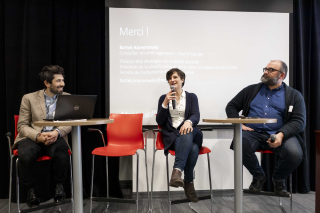 Bartek Komorowski urban mobility professional, and Magali Bebronne, Program Director at Vélo Québec, addressed this during the day’s fourth panel, which focused on the allotment of space, as discussed by Norton and multiple graduate students throughout the day. To decrease automobile use, Komorowski urged for the incorporation of universal accessibility considerations such as cognition, audition, vision, and motor ability. He adds, “Pedestrian signals citywide are being reprogrammed based on lower walking speeds. We are also demanding green infrastructure; we want streets to play a role in the mitigation of climate change.”
Bartek Komorowski urban mobility professional, and Magali Bebronne, Program Director at Vélo Québec, addressed this during the day’s fourth panel, which focused on the allotment of space, as discussed by Norton and multiple graduate students throughout the day. To decrease automobile use, Komorowski urged for the incorporation of universal accessibility considerations such as cognition, audition, vision, and motor ability. He adds, “Pedestrian signals citywide are being reprogrammed based on lower walking speeds. We are also demanding green infrastructure; we want streets to play a role in the mitigation of climate change.”
Regional rail roundtable
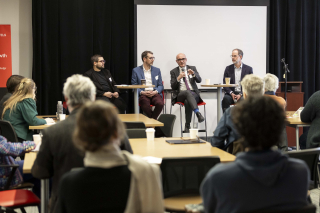 In a final roundtable discussion, Manaugh turned to the transformative potential of railway networks. He asked panelists Rodrigo Victoriano, PhD Student at McGill’s School of Urban Planning, Jean-Francois Cantin from Autorité régionale de transport métropolitain (ARTM), and Ian Hodkinson, Head of Technical Solutions at Alstom, to discuss the current state of regional rail along with the most pressing roadblocks on the path to sustainability.
In a final roundtable discussion, Manaugh turned to the transformative potential of railway networks. He asked panelists Rodrigo Victoriano, PhD Student at McGill’s School of Urban Planning, Jean-Francois Cantin from Autorité régionale de transport métropolitain (ARTM), and Ian Hodkinson, Head of Technical Solutions at Alstom, to discuss the current state of regional rail along with the most pressing roadblocks on the path to sustainability.
“We have to consider that Montreal has a very consolidated system, so transit intervention is usually about small improvements regarding travel times,” said Victoriano. He warned against gentrification and displacement in Canada, a topic that Cantin expanded upon as a member of the modeling and planning division at ARTM. Cantin commended the development surrounding Montreal’s South Shore as well as projects like the REM, though he advocated for better communication between jurisdictions and stakeholders. Hodkinson expressed concern about the tendency for large-scale projects to include private entities or semi-private entities whose profit interests do not reflect public interests.
Policymakers and stakeholders must bear in mind that history reflects the success of streets that prioritize walking, cycling, and public transit as they continue to overcome technical, political, and economic barriers to implementing sustainable transportation systems.
The SGI’s successful Sustainable Transportation Roundtable event effectively brought together interdisciplinary experts to collaborate on solutions and bridge industry, academic, and policy gaps to set a crucial precedent for future initiatives and discussions on sustainable transportation. We extend our gratitude to all participants for their invaluable contributions to this vital conversation.


